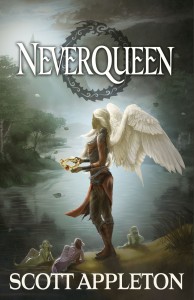How To Deal With Sensitive Subjects (in Christian Spec Fiction)
Contemporary fantasy is swamped by material that runs completely adverse to traditional family values. This is a huge concern for parents and teachers. Young readers, especially, are impressionable to strange philosophies because they have not learned discernment.
Some of these “sensitive” subjects include: violence, magic, atheism, and sexuality. All of which can be complicated to approach in Christian literature.
Family-friendly literature does not need to shy away from these subjects. I think of how the Bible contains stories of everything from slashing open a guy’s belly to God’s judgment on homosexuality. These topics need to be dealt with, but they must not be glorified.
Readers must be shown sin and its consequences. They must live rejection so that they are willing to stand alone for what they know to be true. They must watch a character fall so that they can learn the consequence of living in sin. They must watch the actions of the characters so that they can see the ultimate rewards and penalties.
Do not shy from sensitive subjects. Simply show them in the light of holiness so that the reader aspires to a higher standard. As Christian writers we have a stronger foundation to contrast good and evil in fiction. We don’t just know what a character should and should not do. We know the reason they should and should not do it. We know the why because we know the ultimate Authority behind the why.
– – – – –
 Scott Appleton is a multi-published fantasy author with AMG Publishing (The Sword of the Dragon series) and now a freelance fiction writer whose works focus on reaching family-focused readers. He and his wife Kelley have three wonderfully creative children and they love to travel for his book signing events. Connect with Scott on Facebook and Twitter. Follow his writing journey and download his free ebook, The Writer’s Scrapbook, on his website.
Scott Appleton is a multi-published fantasy author with AMG Publishing (The Sword of the Dragon series) and now a freelance fiction writer whose works focus on reaching family-focused readers. He and his wife Kelley have three wonderfully creative children and they love to travel for his book signing events. Connect with Scott on Facebook and Twitter. Follow his writing journey and download his free ebook, The Writer’s Scrapbook, on his website.










































The problem is that, in real life, the consequences of sin are not necessarily obvious. Yes, there are consequences – but in some cases they may only be in eternity. If we give the impression that it is otherwise, it could give kids a wrong view of reality. Because, in real life, nice people live happy, fulfilling, successful lives, while rejecting God and his ways.
Kirsty,
Thank you for commenting. I greatly enjoy getting thoughtful feedback.
Can you provide an example of what consequences of sin are not necessarily obvious? I agree that many people appear to be successful, etc. on the surface, however there are always consequences to their sin. Perhaps in celebrities it is harder to point to the consequences (because we do not have personal relationships with them) but in the case of people around us who reject God and with whom we have meaningful relationships with there are always consequences that we can point to. Many people put up a façade, but we can teach our youth to see through that facade to the hurting soul behind the mask.
This is why Hebrews 4:12 encourages us with: “The word of God is quick and powerful and sharper than any two-edged sword, piercing even to the dividing asunder of soul and spirit, and of the joints marrow, and is a discerner of the thoughts and intents of the heart.”
We have the tool to teach discernment. We merely need to utilize it for the next generation. It is important that they know how to measure true fulfillment, happiness, and success… because the Devil has a counterfeit for each.
Seems like half an article here!
So, Scott, I’m curious. How do you handle delicate subjects in your books? 🙂
Delicately 😉 My first novel, Swords of the Six, deals in part with abortion by demonstrating the high calling of a mother to bring her child living into the world. My second novel did not really deal with sensitive subjects, but in my third novel I took opportunity to create an atheist protagonist. Readers saw the consequence of that atheist’s decisions when he encountered a demonic presence and had no defense against it.
The moral delimmas in my books are pretty straightforward. In book 1, my hero has to face the bad guy alone despite his own terror. In book 2, the guy wants to just run away and let somebody else handle things–but if he does, everyone will die. Third book, my heroine finds that her magical gift comes with a price tag, which may result in the death of the man she loves.
I can’t do deep and subtle. Big and obvious, that’s my thing. Sex sins don’t interest me, and that’s all Christians ever want to write about. I relate better to cowardice and laziness, personally. They’re just as crippling to a hero.
God leads each writer to deal with what He can best use them for. Sex sins are of interest to me but I have not found a proper place to use something like that. That’d be a really hard subject for any YA fiction! For now I just deal with smaller issues unless I can teach a lesson purely through the story so that it is indirect but still effective in challenging the reader’s thinking.
I disagree somewhat. It doesn’t help to do this unless you can get the complexity of the sensitive subject right. There’s a lot of Christian fiction that will deal with a sensitive subject in a simplistic manner, and really destroy their witness for people who know of the subject. It can descend into platitudes and caricatures too easily.
I think it would be better to handle less serious subjects if you have a full knowledge of it. Like instead of abortion, something like loneliness. Or video game addiction. Or divorce. Something where it’s harder to fall into the trap of making things too simplistic.
DM,
I do see what you mean and I do think we agree. For each of us there we have different subjects that our knowledge is more full on. A subject that may work for me may not work for you, and vice versa. If we each in our own small way contribute to reinforcing traditional Christian values then we are utilizing fiction with the intent that I indicated.